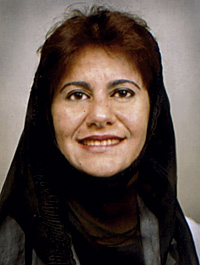RIYADH, 27 November 2004 — A Saudi ophthalmologist who usually has her eyes on the eyes of patients will now have the eyes of the world upon her as she has been named “Arab Woman of the Year.” Dr. Selwa A.F. Al-Hazzaa has become the first Saudi woman to win the prestigious award for excelling in a male-dominated bastion of medical sciences and community service.
The Dubai-based Arab Women Studies Center (AWSC), a high-profile think tank with a mandate to promote women’s causes in the region, has conferred this prestigious award on Al-Hazzaa in recognition of her outstanding contribution to the medical science and her pioneering efforts for women’s emancipation. An ardent advocate of Saudi governmental reform initiatives, Al-Hazzaa has been working as an adviser on women’s issues to the Shoura Council.
In a wide-ranging interview, Al-Hazzaa told Arab News that she was one of 10 women, including Dr. Hannan Ashrawi, nominated by AWSC for the award. The award for 2005 will be presented in Cairo early next year.
This biennial award, comprising a citation, a medal and cash prize will be presented to the women by Amr Moussa, secretary-general of the Arab League.
Al-Hazzaa, head of ophthalmology at King Faisal Specialist Hospital & Research Center (KFSH&RC), has also been appointed visiting professor at Wilmer Ophthalmological Institute at The John Hopkins University School of Medicine in Baltimore. The award recognizes her achievements in the medical field and her social work.
Al-Hazzaa has been working in the field of ophthalmology and community services in Saudi Arabia for several years. She is credited with the publication of 48 scientific papers and handling 13 research projects besides being a guest speaker at 37 national and international scientific seminars. She has a special interest in ophthalmic genetics, and she became the first Saudi to contribute a new chapter on genetic eye diseases in the US-based Duane Ophthalmology Medical Reference Series.
Referring to her outstanding contributions in the field of genetic diseases, which also helped her to win her most recent award, Al-Hazzaa said that “being a Saudi myself, I was well aware that genetic diseases are widespread, both in the Kingdom and in the Middle East. I was also convinced that something must be done to bring the diseases under control.”
She said that genetic eye diseases or metabolic problems occur because of marriage between first cousins. “For the sake of saving the community from genetic diseases, all future couples must undergo a medical examination before they begin conjugal life,” said Al-Hazzaa, who is also known in the field of genetic counseling. So far, she has received 118 awards and commendations in addition to membership in a large number of scientific and commercial organizations.
Al-Hazzaa will be part of a high-level Saudi commercial delegation, which is likely to visit London and Moscow early next year.
She is working on many programs and projects launched by the Saudi Chamber of Commerce and Industry particularly in the field of trade and economy and areas where involvement of women is possible.
A medical graduate of King Saud University, Riyadh, she is married to Abdullah Al-Obaidallah, an official in the Ministry of Higher Education. She has three children.


